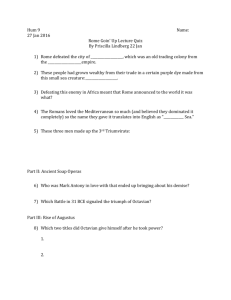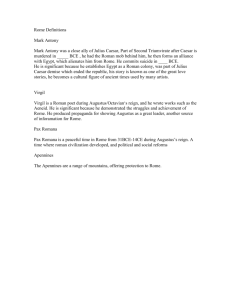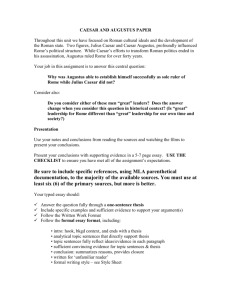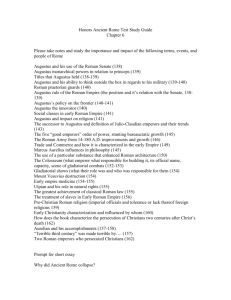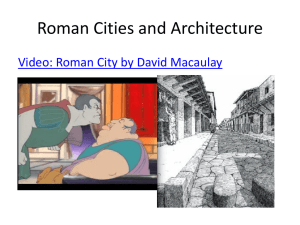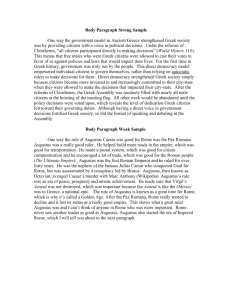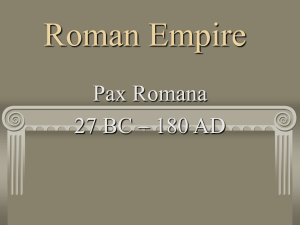The Age of Augustus Caesar.
advertisement
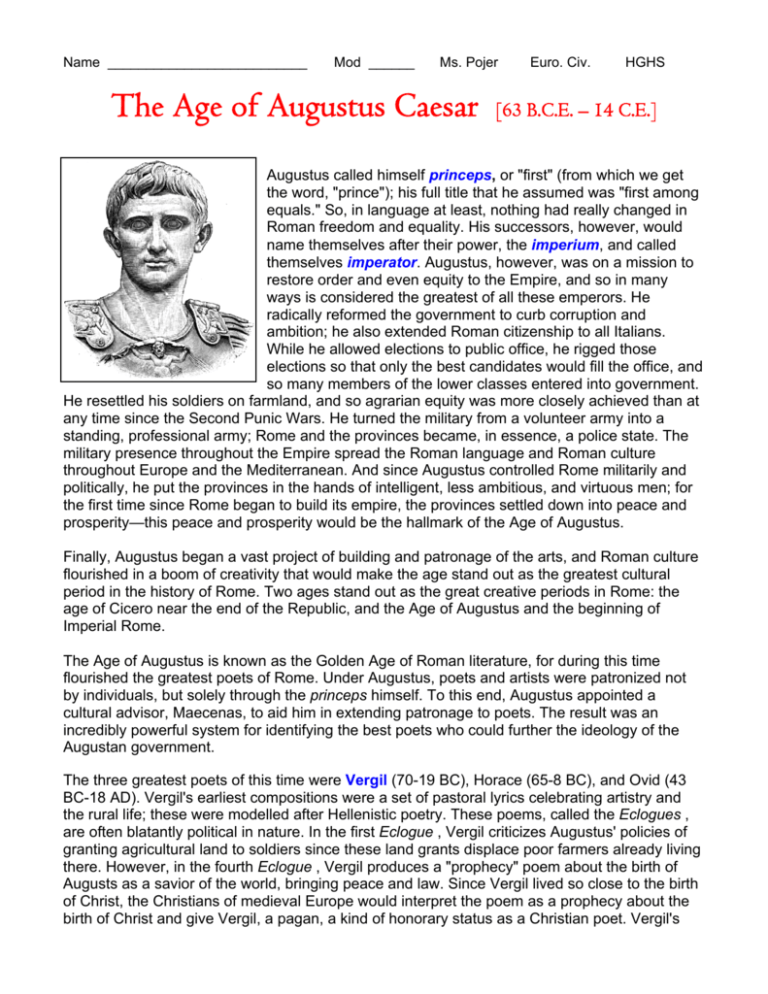
Name __________________________ Mod ______ Ms. Pojer The Age of Augustus Caesar Euro. Civ. HGHS [63 B.C.E. – 14 C.E.] Augustus called himself princeps, or "first" (from which we get the word, "prince"); his full title that he assumed was "first among equals." So, in language at least, nothing had really changed in Roman freedom and equality. His successors, however, would name themselves after their power, the imperium, and called themselves imperator. Augustus, however, was on a mission to restore order and even equity to the Empire, and so in many ways is considered the greatest of all these emperors. He radically reformed the government to curb corruption and ambition; he also extended Roman citizenship to all Italians. While he allowed elections to public office, he rigged those elections so that only the best candidates would fill the office, and so many members of the lower classes entered into government. He resettled his soldiers on farmland, and so agrarian equity was more closely achieved than at any time since the Second Punic Wars. He turned the military from a volunteer army into a standing, professional army; Rome and the provinces became, in essence, a police state. The military presence throughout the Empire spread the Roman language and Roman culture throughout Europe and the Mediterranean. And since Augustus controlled Rome militarily and politically, he put the provinces in the hands of intelligent, less ambitious, and virtuous men; for the first time since Rome began to build its empire, the provinces settled down into peace and prosperity—this peace and prosperity would be the hallmark of the Age of Augustus. Finally, Augustus began a vast project of building and patronage of the arts, and Roman culture flourished in a boom of creativity that would make the age stand out as the greatest cultural period in the history of Rome. Two ages stand out as the great creative periods in Rome: the age of Cicero near the end of the Republic, and the Age of Augustus and the beginning of Imperial Rome. The Age of Augustus is known as the Golden Age of Roman literature, for during this time flourished the greatest poets of Rome. Under Augustus, poets and artists were patronized not by individuals, but solely through the princeps himself. To this end, Augustus appointed a cultural advisor, Maecenas, to aid him in extending patronage to poets. The result was an incredibly powerful system for identifying the best poets who could further the ideology of the Augustan government. The three greatest poets of this time were Vergil (70-19 BC), Horace (65-8 BC), and Ovid (43 BC-18 AD). Vergil's earliest compositions were a set of pastoral lyrics celebrating artistry and the rural life; these were modelled after Hellenistic poetry. These poems, called the Eclogues , are often blatantly political in nature. In the first Eclogue , Vergil criticizes Augustus' policies of granting agricultural land to soldiers since these land grants displace poor farmers already living there. However, in the fourth Eclogue , Vergil produces a "prophecy" poem about the birth of Augusts as a savior of the world, bringing peace and law. Since Vergil lived so close to the birth of Christ, the Christians of medieval Europe would interpret the poem as a prophecy about the birth of Christ and give Vergil, a pagan, a kind of honorary status as a Christian poet. Vergil's second work is a versified manual on farming called The Georgics , which had as its subject not only the agricultural life, agrarian values (which the Romans saw as the core set of values in their culture), but also speculation on the natural world and the role of poetry. But Vergil's greatest contribution to Roman literature was the Aeneid , an epic, heroic poem about the founding of Roman civilization by Aeneas, a Trojan hero in flight from the destruction of Troy. The subject of the Aeneid is the greatness of Rome, of the Augustan Age, and Roman values. Chief among these values are pietas , or "piety, respect for authority," virtus , or "manliness, fortitude in the face of adversity," and officium, or duty. Aeneas represents the Stoic values of suffering in order to bring about a better future; he, like Augustus and the best Romans, is marked by his willingness to sacrifice himself for the greater good of the people and history. For the poem is about Aeneas setting aside his own concerns in order to take care of the people he is taking from Troy. This concern for his people goes beyond their safety; the successful migration of the Trojans is the prerequisite for the founding of Rome. The lesson that Aeneas has to learn is to sacrifice all his own personal concerns for a future that he will never see and will never enjoy. For the Stoic philosophy which imbues every aspect of this great poem on Roman virtue held that the universe was patterned, that it had a larger purpose and meaning, which the Stoics called logos , and that this logos originated in the divine mind which ruled the universe. Humans, who do not have the ability to comprehend this logos, nonetheless must serve and further it. In a scene that aroused passion and emotion in his audience, Vergil narrates how Aeneas, just as he is about to begin his battle for Italy, is handed a shield crafted by the god Vulcan with the entire history of Rome sculpted on its outer surface. The final lines describing this scene, when Aeneas has looked over all the history of Rome and has no idea what any of it means, takes the shield onto his shoulders perfectly defines the Roman view of morality, the state, and the individual: All these images Aeneas admires on Vulcan's shield, given to him By his mother, and, comprehending nothing Of the events pictured thereon, He felt proud and happy, and took upon his shoulder All the future fame and glory of his descendants. Horace, on the other hand, wrote both poems that glorified the Empire and the family of Augustus and poems that described the joys and irritations of everyday life in Rome. These latter poems, called satires, largely concern moral evaluations of everyday and mundane behavior. Ovid, on the other hand, wrote primarily about love and sexual looseness; when he wrote a poetic book called The Art of Love, which was largely a manual on sexual seduction, Augustus misunderstood it and exiled the poet. For the book is not about sexual seduction, but really concerns the difference between ethics (love) and art (seduction). Ovid's greatest poem is the Metamorphoses , which is the richest storehouse of Greek and Roman myth from antiquity. Augustus also patronized art and sculpture with the same passion and fervor that he patronized literature. He began enormous building projects, including several temples, the Temple to Apollo in the Palatine Hill, and the Roman Forum. SOURCE: Professor Richard Hooker, “Washington State University’s World Civilizations course: Rome-The Age of Augustus,” 1996. http://www.wsu.edu:8080/~dee/ROME/ROME.HTM (modified for high school students)
